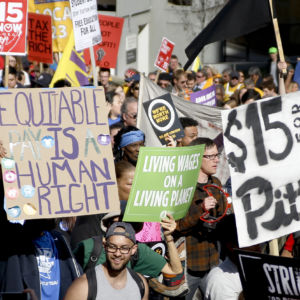Seattle has experienced a loss in employment and overall wages since phasing in the $15 minimum wage, according to a study Monday. But a separate report counters that analysis is fundamentally flawed.
Seattle offers a unique view into the $15 minimum wage since it was the first place to pass the policy in June 2014. The city has drawn attention from academics and lawmakers curious about its potential impact. The policy was later adopted by dozens of cities across the country, as well as New York and California.
The Seattle increase is written to phase in over a few years making its full impact unclear. A study out of the University of Washington (UW) found Monday that the increase has already had a negative impact on local employment. The Economic Policy Institute (EPI) countered in a separate study that the findings are questionable.
“The lost income associated with the hours reductions exceeds the gain associated with the net wage increase of 3.1%,” the UW study concluded. “The reduction in hours would cost the average employee $179 per month, while the wage increase would recoup only $54 of this loss, leaving a net loss of $125 per month.”
EPI found much more positive results when looking at the increase themselves. It contests the negative analysis has data and methodological problems that caused it to find job losses in places there are none at all. The EPI study, for instance, notes the estimated job loss is even well above other critical reports.
“The estimated size of the employment losses in the Seattle study lie well outside the range found in earlier research, including research conducted by consistent critics of the minimum wage,” the EPI study notes. “Seattle was a relatively high-wage city even before the wage ordinance went into effect. Scaled to the city’s median wage level, the minimum wage increases have been comfortably within the range of national historical experience, which makes the authors’ very large estimated job losses suspect.”
The UW study is part of an ongoing analysis to determine how the increase is impacting the city. The Seattle City Council commissioned the university to review the policy as it gradually gets phased in. The EPI notes the university has an even greater responsibility to conduct an unbiased study given its position.
Lawmakers typically design the $15 minimum wage to phase in over a number of years. The gradual implementation is intended to give employers time to adjust. Seattle opened the new year by reaching $13.50 an hour. The city is scheduled to finally hit $15 an hour at the start of next year.
The EPI study adds that the potential job loss in the UW analysis is upwards of 10 times larger than what most other research has determined thus far.
The UW study also found that there has been a slight uptick in employment for people making above $19.00 an hour, which runs counter to many other studies. Employers may be looking for higher-skilled workers in order to compensate for the increased cost of labor. The employment gains, however, weren’t enough to offset the losses experienced by workers making less than $19 an hour.
The Fight for $15 and other supporters argue the policy could help lift low-wage workers out of poverty. They have argued the current federal minimum wage of $7.25 an hour is too low for people to reasonably live on. The increase might also spur economic growth with a rise in discretionary income.
The $15 minimum wage has drawn plenty of criticism over its potential impact on employment. Critics warn it will actually hurt the poor by reducing employment opportunities. Employers could be forced to reduce their staff or increase prices to overcome the added cost of labor.
“Policymakers who let evidence rather than ideology guide their decision-making process should pay careful attention to today’s report,” Michael Saltsman, managing director at the conservative Employment Policies Institute, told InsideSources. “Rather than raising wages at the bottom end of the pay scale, the Fight for $15 has left many employees worse off. The Fight for $15 has always been a fight against economic common sense, and now we have the anecdotal and empirical evidence to prove it.”
Economists have come to various conclusions on whether the $15 minimum wage is good policy. The University of California, Berkeley, found in a study June 20 that the Seattle policy helped to increase wages while having little impact on employment. Studies elsewhere have found employment loss can be severe, especially for low-skilled workers.
“This important study ought to be a big wake-up call that the ‘Fight for $15’ minimum wage effort is actually hurting those they say they want to help — reducing incomes and eliminating economic opportunities for low-income Americans who need them most,” Jeremy Adler, communications director for the conservative nonprofit America Rising Squared, told InsideSources in a statement.
The Fight for $15 movement has been at the forefront of the minimum wage debate since it started in November 2012. The movement launched numerous protests and informational campaigns in support of the policy. It is primarily supported by labor unions like the Service Employees International Union (SEIU).

